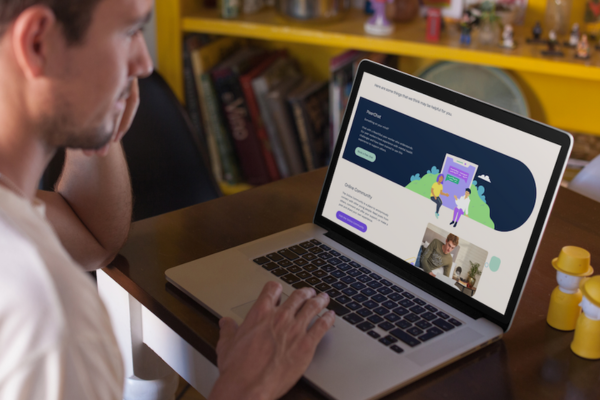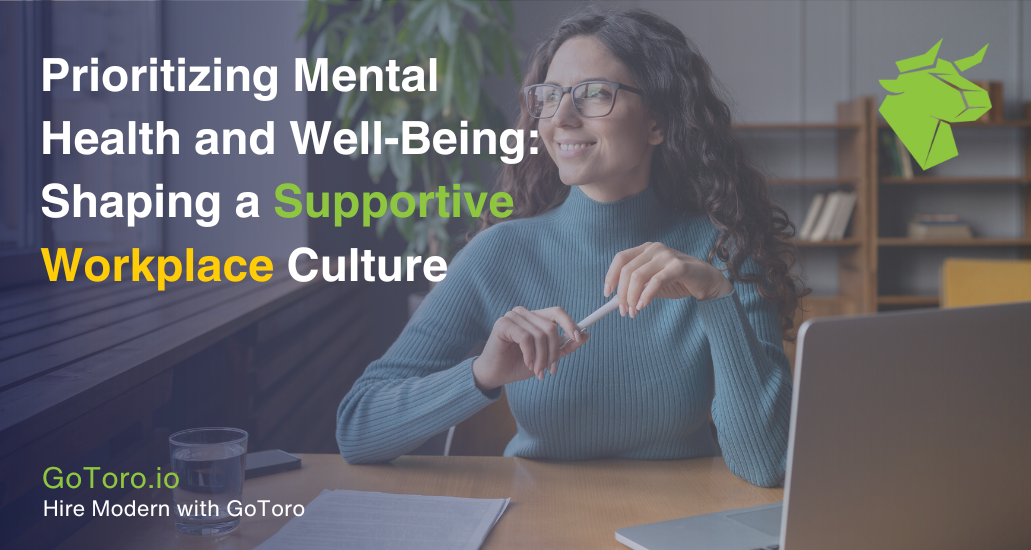The Importance of Mental Health for Employees
In today’s dynamic work environment, the importance of mental health for employees cannot be overstated. Mental health and well-being are critical components of a productive and engaged workforce. Companies that prioritize mental health for employees create a supportive and positive work culture, which leads to numerous benefits for both the employees and the organization.
Benefits for Productivity, Engagement, and Retention

When mental health for employees is prioritized, the benefits extend to productivity, engagement, and retention. Employees who feel mentally healthy and supported are more likely to be engaged in their work, leading to higher productivity levels. Additionally, a focus on mental health for employees can significantly reduce turnover rates, as employees are more likely to stay with an organization that values their well-being.
Brief Overview of the Blog Content
This blog will explore the current trends in mental health support in the workplace, highlighting the innovative technologies and strategies companies are using to prioritize mental health for employees. We will delve into the benefits of AI-powered apps, virtual therapy and counseling, Employee Assistance Programs (EAPs), mindfulness and meditation apps, mental health analytics, and online portals. Each section will provide insights into how these tools can help create a supportive work environment.
A Significant Statistic
According to a study by Harvard Business Review in 2021, 83% of employees believe that their employer should provide mental health resources. This statistic underscores the growing demand for mental health support in the workplace and the expectation that employers play a significant role in providing these resources.
Trends: General Trends in Mental Health Support in the Workplace
Evolving Trends
The landscape of mental health support in the workplace is rapidly evolving. More organizations are recognizing the importance of mental health for employees and are implementing various strategies to support their workforce. Key trends include the integration of digital mental health tools, increased access to virtual therapy, and the development of comprehensive mental health training programs for managers.
AI-Powered Mental Health Apps
The Role of AI in Supporting Mental Health for Employees
AI-powered mental health apps are becoming increasingly popular as a means to support employees. These apps leverage artificial intelligence to provide cognitive-behavioral therapy (CBT), real-time assistance, coping strategies, and mood tracking. Examples of such apps include Woebot and Wysa, which offer employees tools to manage stress and anxiety effectively.
Examples and Offerings
- Provides CBT through chatbots, offering real-time support and mood tracking.
- Offers mental health support through AI-driven chatbots that provide coping strategies and emotional assistance.
Benefits of AI-Powered Mental Health Apps
These tools help employees manage stress and anxiety effectively by providing immediate support and personalized mental health resources. The use of AI-powered mental health apps can also complement other mental health initiatives within the organization.
Training Programs for Managers
According to SHRM, 54% of organizations have implemented mental health training programs for managers to help them recognize and address mental health issues in their teams. This integration of training programs and AI-powered apps can create a more holistic approach to supporting the well being of employees.
Virtual Therapy and Counseling: Enhancing Mental Health for Employees

Platforms for Virtual Therapy and Counseling
Virtual therapy and counseling have become essential tools in supporting mental health for employees. Platforms such as BetterHelp and Talkspace offer convenient and accessible services, making it easier for employees to seek the help they need.
Features of Virtual Therapy Platforms
- Employees can schedule and attend therapy sessions online, eliminating the need for in-person visits.
- These platforms connect employees with licensed mental health professionals who provide expert guidance and support.
- Therapy sessions are conducted via secure video calls, ensuring privacy and confidentiality.
Accessibility of Virtual Therapy
One of the significant advantages of virtual therapy is its accessibility. Employees can access professional help without leaving their homes, making it a practical solution for those with busy schedules or limited access to in-person therapy. This flexibility has made virtual therapy an increasingly popular option.
Impact of the Pandemic on Virtual Therapy
The use of teletherapy services increased by 1000% during the pandemic and continues to be a popular option for employees (McKinsey & Company, 2022). This surge highlights the growing need for accessible mental health resources and the effectiveness of virtual therapy in meeting this demand.
Employee Assistance Programs (EAPs): Comprehensive Support for Mental Health for Employees

Modern Integrations in EAPs
Employee Assistance Programs (EAPs) have evolved to incorporate modern digital solutions, enhancing their effectiveness in supporting employees. These integrations make EAPs more accessible and comprehensive.
Services Offered by EAPs
- EAPs provide confidential counseling services to help employees manage personal and work-related issues.
- Employees can access legal consultations for personal or professional matters.
- EAPs offer financial counseling to help employees with budgeting, debt management, and other financial concerns.
Accessibility Through Digital Solutions
Modern EAPs utilize digital platforms, mobile apps, and online services to ensure employees can easily access the support they need. This digital integration allows for on-demand assistance, making EAPs more effective in providing timely help.
Prevalence of EAPs Among Large Employers
According to the Business Group on Health (2023), 97% of large employers (over 5,000 employees) now offer EAPs, providing access to mental health services and support. This statistic demonstrates the widespread recognition of the importance of mental health for employees and the commitment of large organizations to offer comprehensive support.
Incorporating these sections ensures that the key phrase “mental health for employees” is emphasized throughout, highlighting the importance of accessible mental health resources in the workplace.
Mindfulness and Meditation Apps:
Popular Mindfulness and Meditation Apps
Mindfulness and meditation apps are powerful tools for promoting mental health for employees. Two of the most popular apps in this category are Headspace and Calm, both of which offer a range of features designed to support mental well-being.
Offerings of Mindfulness and Meditation Apps
- Headspace and Calm provide guided meditation sessions that help employees practice mindfulness and reduce stress.
- These apps offer a variety of mindfulness exercises that employees can incorporate into their daily routines to enhance their mental health.
- Relaxation techniques, such as deep breathing exercises and sleep stories, help employees relax and unwind, improving their overall mental health.
Benefits of Mindfulness and Meditation Apps
The use of mindfulness and meditation apps can significantly benefit mental health for employees. These tools help reduce stress, improve focus, and enhance overall well-being. By incorporating mindfulness and meditation into their daily lives, employees can better manage their stress levels and maintain a positive outlook.
Mental Health Analytics: Leveraging Data for Employee Well-being
The Role of Data Analytics in Mental Health for Employees
Mental health analytics is an emerging field that uses data to identify patterns and trends in employee well-being. By analyzing data from various sources, organizations can gain valuable insights into the mental health of their workforce and take proactive measures to support their employees.
Tools for Mental Health Analytics
- Companies can track how often employees use mental health apps and which features they find most helpful. This data provides insights into the overall mental health landscape of the workforce.
- Wearables, such as fitness trackers and smartwatches, can collect data on physical activity, sleep patterns, and stress levels. Analyzing this data helps HR professionals understand the correlation between physical and mental health.
Outcomes of Mental Health Analytics
Using mental health analytics, HR professionals can take proactive measures to address mental health issues within the organization. This data-driven approach allows for the early identification of potential problems, enabling timely interventions. Ultimately, leveraging data analytics to support the mental well-being for employees leads to a healthier, more engaged, and productive workforce.
Incorporating mindfulness and meditation apps along with mental health analytics demonstrates a comprehensive approach to supporting mental health for employees. These tools provide tangible benefits and actionable insights, helping create a supportive and resilient workplace culture.
Online Portals: Essential Tools for Employee Well-Being

Comprehensive Resources Offered by Online Portals
Online portals are vital tools in supporting employees’ well-being. These portals provide a wealth of resources that employees can access to manage their mental health effectively. Key offerings include:
- Informative articles on various aspects of mental well-being providing employees with valuable insights and tips.
- Interactive webinars that educate employees, and offer practical advice.
- Tools that allow employees to assess their mental health and identify areas where they may need support.
Accessibility of Online Mental Health Portals
One of the significant advantages of online mental health portals is their accessibility. Employees have access to a wide range of information and support resources anytime and anywhere. This ease of access ensures that employees can find the help they need when they need it, contributing to better mental health management.
The Impact of Lack of Mental Health Support
73% of Gen Z employees have left a job due to a lack of mental health support (CNBC, 2019). This statistic underscores the critical need for employers to provide robust mental health resources to retain their workforce.
Impact on Retention: The Role of Mental Health Support
Enhanced Employee Retention Through a Supportive Work Environment
Prioritizing well-being has a direct impact on employee retention. A supportive work environment that values mental health leads to higher employee satisfaction and loyalty. Employees who feel prioritized are more likely to remain engaged, productive, and committed to their organization.
Correlation Between Mental Health and Employee Loyalty
There is a clear correlation between mental health support and increased engagement, productivity, and loyalty. When companies actively support mental health, they create a positive work culture that encourages employees to perform their best and stay with the organization longer.
A Significant Statistic on Turnover Rates
According to Deloitte (2021), companies that actively support mental health see a 50% reduction in employee turnover rates. This statistic highlights the profound impact that prioritizing mental health can have on reducing turnover and retaining top talent.
Companies’ Commitment to Mental Health
Organizations that commit to reducing turnover rates and attracting top talent recognize the importance of mental health support. By investing in mental health resources and creating a supportive work environment, companies demonstrate their dedication to their workforce’s overall well-being.
Incorporating online mental health portals and focusing on retention strategies underscores the importance of mental health support. These efforts lead to a healthier, more engaged, and loyal workforce, benefiting both employees and the organization as a whole.
Incorporating mental health technologies into HR strategies is crucial for modern organizations. These tools offer essential support, fostering a healthier and more resilient workforce. By integrating innovative solutions such as AI-powered apps, virtual therapy, and comprehensive online portals, companies can provide the necessary resources to help employees manage stress and anxiety effectively.
Prioritizing employee well-being through these technologies not only enhances overall health and productivity but also strengthens loyalty and engagement. As awareness of mental health continues to grow, organizations that invest in these resources will lead the way in creating supportive and inclusive workplace cultures, ensuring long-term success and sustainability.


